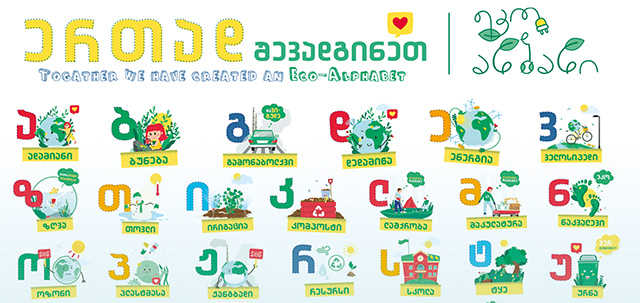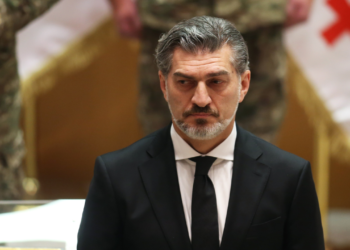At the end of last year, the organization Keep Georgia Tidy (KGT) proposed to school pupils the idea of creating a joint Eco-Alphabet and a special environmental competition. According to the rules, the pupils should come up with a word related to environmental protection and ecological threats, or an environmental message for each letter and draw a relevant image. As a result of their joint efforts, the first Eco-Alphabet was created, with the participation 165 Georgian pupils.
According to the terms of competition, the authors of the best works were identified. School pupils from Racha – Lechkhumi and Kvemo Svaneti, Guria, Samegrelo-Zemo Svaneti, Imereti, Kvemo Kartli, Shida Kartli, Kakheti and Tbilisi were given special, environmentally friendly gifts from KGT partner organizations Tene and Oriflame.
“We are constantly thinking about how to involve schoolchildren in environmental educational activities,” Elene Loladze, Project Manager at Keep Georgia Tidy, tells us. “A proven approach for this is to create a variety of environmental competitions in which children participate with great joy. Students from all over Georgia participate in the activities we offer and present truly different solutions to environmental issues. Our eco-alphabet competition, on which the students worked with great enthusiasm, is a proof of this. Together with them, we were able to create a Georgian eco-alphabet, which will be a good helper for schools and kindergartens so that students can get more knowledge about environmental care and protection.”
As a result of the competition, a digital version of the unified eco-alphabet was printed as a poster, which is available to view, download and use by all interested kindergartens and schools. Head over to the website of KGT ecolog.online or contact the organization on Facebook.
One of the main directions of the organization Keep Georgia Tidy is the development of environmental knowledge and skills among students. Therefore, in 2020, KGT became a local representative of the Foundation of Environmental Education (FEE) in Georgia, and, in cooperation with it, implements the international program of Eco-Schools. The project is run with the financial support of the Swedish government with the involvement of both local and international partners. In close cooperation with the ministries of Environmental Protection and Agriculture (MEPA), Education and Science (MES), and the Center for Environmental Information and Education (CEIE).














